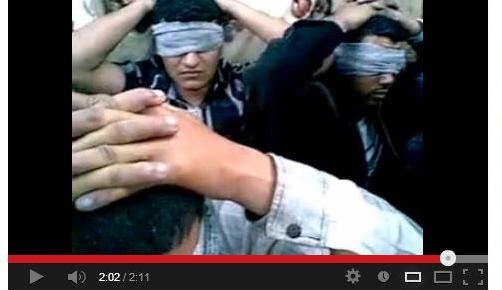Latest NEWS
- Aswat Masriya, the last word
- Roundup of Egypt's press headlines on March 15, 2017
- Roundup of Egypt's press headlines on March 14, 2017
- Former Egyptian President Hosni Mubarak to be released: lawyer
- Roundup of Egypt's press headlines on March 13, 2017
- Egypt's capital set to grow by half a million in 2017
- Egypt's wheat reserves to double with start of harvest -supply min
- Roundup of Egypt's press headlines on March 12, 2017
Egyptian army boosts forces in Sinai after kidnapping

A snapshot from a circulated YouTube video of the allegedly kidnapped soldiers in Sinai
By Yousri Mohamed
EL-ARISH, Egypt, May 20 (Reuters) - The Egyptian army sent reinforcements into the Sinai Peninsula on Monday after President Mohamed Mursi said there would be no talks with militant Islamists who abducted seven members of the security forces last week.
Radical Islamists have expanded into a security vacuum in Sinai that the state has struggled to fill since an uprising swept autocrat Hosni Mubarak from power in 2011. The groups have launched attacks on Israel and targets in North Sinai.
The kidnapping has highlighted lawlessness in the peninsula bordering Israel, enraged Egyptian security forces and piled domestic pressure on Mursi to act. Egyptian security forces have blocked border crossings into the Gaza Strip to pressure the government into helping free their colleagues.
Witnesses saw armoured personnel carriers moving east on Monday over the Suez Canal towards North Sinai where militants staged the abduction and where gunmen assaulted a police base on Monday. They later arrived in the North Sinai town of El-Arish, accompanied by the commander of Egypt's second field army.
A military official said the extra military forces were dispatched to Sinai after a meeting on Sunday between the army command and Mursi, who has promised not to submit to blackmail by kidnappers demanding the release of jailed Islamists.
Presidential spokesman Omar Amer said: "All options are on the table to free the kidnapped soldiers."
The state-run Al-Ahram newspaper said on its website that shipping in the Suez Canal had been briefly halted as the reinforcements crossed the waterway.
"Our patience has run out," Al-Ahram quoted a military official as saying in its print edition.
As security began to unravel in the peninsula later in 2011, Israel agreed to Egyptian requests to deploy more troops there than allowed by the countries' 1979 peace treaty. The Israeli defence ministry had no immediate comment on the new deployment.
The Sinai is mainly a large swathe of rugged, thinly populated desert but its Red Sea coast has a string of international tourist resorts.
MURSI FACES TOUGH CHOICE ON ACTION
"Our impression is that the Israelis are eager for Egypt to improve the security situation in the Sinai, and it's unlikely that they would object," said a Western diplomat in Cairo.
Egyptian security forces launched a security operation to re-establish control in Sinai last August after an attack that killed 16 Egyptian border guards.
Mursi said on Sunday there would be no talks with "the criminals" - a reference to militants who adhere to a more radical school of Islam than the president's Muslim Brotherhood.
The kidnappers are demanding the release of militants convicted last year of the attacks that killed seven people, six of them members of the security forces, in 2011.
A video posted online on Sunday showed seven blindfolded men with their hands bound above their heads. They said they were the hostages, begging Mursi to free political detainees in Sinai in exchange for their own release. Al-Masry Al-Youm, an independent newspaper, reported that parents and friends of some of the men who appeared in the video had confirmed their identities. The video's authenticity could not be independently confirmed.
"In domestic political terms, Mursi is going to be damned if he does and damned if he doesn't," said Yasser El-Shimy, Egypt analyst with the International Crisis Group.
"If he negotiates, he will be criticised for being too lenient with Islamist militants, and if he tries to wage an operation to free them, which may entail casualties, then he is also going to be widely criticised." (Additional reporting by Shaimaa Fayed, Maggie Fick and Tom Perry in Cairo and Nidal al-Mughrabi in Gaza; Writing by Tom Perry; Editing by Mark Heinrich)










